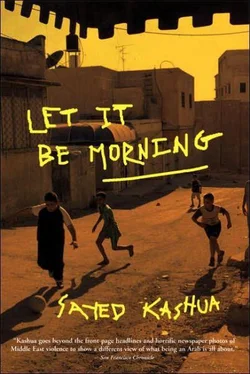Sayed Kashua
Let It Be Morning
PART ONE. Everything Has to Be Wonderful Here
The door gives a terrible screech as my mother opens it. The children’s bedroom gives off a musty smell, like a secondhand bookstore that people hardly visit. She hurries over to the window and opens it, wipes some of the dust off the desk with her dust cloth, and says “See, nothing’s changed.” And I look at her, so changed, so tired, so old. She gives me her usual look, the one that always says everything will be okay.
“The food will be ready in a minute.”
“I’m not hungry, Mom.”
“I bet you haven’t eaten since this morning. Come on, eat it while it’s still warm. It’ll take a while. Go take a nap, and I’ll call you. There’s pea soup too.”
My mother is sensitive enough to close the door on her way out. I look around the room I left ten years ago. Nothing’s changed, except for the fact that nobody lives in it. The three cots stand empty, evenly spaced. I was the first of the three brothers to leave this room, and now I’m the first to return. Nothing’s changed, except perhaps the smell, which I still can’t manage to ignore, and now I can imagine what being forsaken smells like.
I put down my duffel bag, the black one that’s been with me ever since my university days, and lie down on the middle bed, the one that was always mine. The feel of the bed is further evidence that nobody has visited this room in a good many years. The mattress gives off a kind of dampness, and by the smell of the sheets and the pillow I can tell that my mother hasn’t changed them since we left for the last time. I look up at the high ceiling and see some green and black circles of mildew on the section right above me. Once my father would fix the leaks right away, climbing up on the roof and applying special sealants, then painting over them. Judging by the big stain, he doesn’t bother anymore, as if the children’s room isn’t part of the house now. As if it doesn’t really exist.
I never imagined this room could be so quiet. This room, which once buzzed with life, with screaming and games and countless squabbles, is utterly still now, everything frozen in place, everything just so. The books on the shelves have been arranged in order of the grades in which we used them. My mother hasn’t thrown out so much as a single book, not even the ones from elementary school. They’re all there in the bookcase. And our three names are still written on the three drawers, as if we’re still liable to fight over who gets which one. Three chairs, side by side, evenly spaced, face the long desk that Father made especially for us. He forced us to do all our homework there, sitting stiffly on our chairs, which we weren’t allowed to move an inch. My father took exact measurements, and drew four circles on the floor for each of the chairs. That’s where the legs had to stay. As we grew taller, he would move the circles, seeing to it that the distance from the desk fit our new size. Nothing pleased him more than to come home, open the boys’ room and see us sitting in our set positions, our faces immersed in books and notebooks. We always made a point of assuming that favorite pose of his when we knew he was about to return from work. It was no trouble. In fact, it was kind of fun, and as soon as he shut the door behind him, no matter how much we’d been fighting, we’d almost always give each other the look, and giggle.
My chair was in the middle, the one farthest from the desk. I get up off the bed and look at it. I was the largest one in the family, taller even than my older brother. I take a good look at the floor and discover that the red marks are still there, and that the chairs are positioned right on the last circles Father etched into it. I take my seat, the middle one, and discover that my body hasn’t grown since I finished high school. The chair is exactly the right distance from the desk, and my posture is just right, almost completely straight. And as I try to pretend to be writing, my body leans forward in the chair at precisely the angle that Father claimed was the healthiest and the best one. I smile now, and the smile gives me a strange feeling, like when a muscle that’s been slack for a long time wakes up, coming back into use.
I reach out to the drawer that bears my name in thick red letters and pull it out till it nearly touches my stomach. The drawer is filled with papers, meticulously arranged, all the way to the top, till there isn’t room for even one more sheet. I pull out the whole stack and put it on the desk in front of me. My mother has kept everything in order. Even the picture they gave us when we finished kindergarten is in that drawer. A blue sky, a yellow sun with eyes and a smiling mouth, and red flowers. It’s all there, sorted by year, in sequence, every report card from first to twelfth grade, trimester by trimester. Class pictures of every single year. Right on top is my matriculation certificate, and below it the high school class picture. Every kid in my class, in little squares, row by row along the bottom half. Above them are the passport pictures of my teachers, in bigger squares. And in the top center is the principal, who got the biggest picture of all, right above the school name and logo.
The students’ pictures are so small you can hardly make out their faces. If it weren’t for the names underneath each one, in tiny letters too, I’d never find my own. I take a close look at the little square that contains me and remember how scared I was of leaving this room, this place. How I’d been 100 percent certain that this was where I wanted to stay forever. How I’d spent the whole night crying before moving to a different city, to study there and live there. And how the place that had always been home to me gradually began to seem menacing. I remember how on the day I left, carrying my black duffel bag, the only thing I wanted was for my three years of school to go by quickly so I could hurry back. How I’d sobbed when all the neighbors and all our relatives, who make a habit of coming to say good-bye during the week before someone leaves, kept congregating in our yard each evening, bringing presents, comforting my parents and trying to cheer them up. How I’d cried when I left, how I was crying now, when I had no choice but to return.
I look at the little square photos beside mine. I used to think I’d never forget my schoolmates, and now, as I look them over, I discover that I haven’t thought back about a single one of them. The kids in my class always seemed to me like a blob of faces following me wherever I went, but as I look at this class picture and study them one by one, they seem so odd, so distant. Even their names have been blotted out of my memory in the ten years that have gone by. I haven’t spoken with any of them in all that time, or before that either, but at least I used to see them almost every day. Why the hell do I imagine them now as more dangerous than they were? Why am I afraid of them, afraid of bumping into them?
I read the names out loud, and they grab me and take me back. God, who are all these people? What are they doing now? And I go on studying their pictures: Jamil Hazkhiyyeh, Nabil Nasser, Haytham Sultan, Hanan Fadilla. I’ve forgotten them all, the students, the teachers, the principal. But I’m back now, and I’ll have no choice. They’re nearby, practically next door, and I’m bound to bump into them. I’ve got to be careful. I stare at the papers, one by one, and read the comments the teachers wrote over the years. I didn’t receive a single bad mark, except in subjects like phys ed and shop and metalworking. I thumb through the pages in awe, turning them carefully and placing them one on top of the other, taking care not to do anything that would upset the order my mother had imposed.
Читать дальше












